 We lived under the same roof for less than two months. The short time gave us many answers to the question, “What makes a house a home?” Shared meals and laughter became the foundation. Courage to tell each other our hard life experiences formed a beautiful entryway. Talking while cooking and cleaning side by side put up an internal framework that remains.
We lived under the same roof for less than two months. The short time gave us many answers to the question, “What makes a house a home?” Shared meals and laughter became the foundation. Courage to tell each other our hard life experiences formed a beautiful entryway. Talking while cooking and cleaning side by side put up an internal framework that remains.
All in Hospitality
 Philip woke at eight the next morning and started the percolator. Around nine we decided that we wanted to treat everyone to coffee in their rooms, so I assembled the trays with pretty mugs and sprigs of holly and cream and sugar and, each carrying one, we ascended the stairs, grinning at one another like children. We delivered their coffee with bright greetings, and Philip started the fires in their rooms so that they could relax in bed for a while before breakfast. I told them we would eat in an hour: already the sacrosanct aromas of my mother’s Christmas Morning Breakfast Casserole, reserved for only the most special of occasions, was filling the air with invitation.
Philip woke at eight the next morning and started the percolator. Around nine we decided that we wanted to treat everyone to coffee in their rooms, so I assembled the trays with pretty mugs and sprigs of holly and cream and sugar and, each carrying one, we ascended the stairs, grinning at one another like children. We delivered their coffee with bright greetings, and Philip started the fires in their rooms so that they could relax in bed for a while before breakfast. I told them we would eat in an hour: already the sacrosanct aromas of my mother’s Christmas Morning Breakfast Casserole, reserved for only the most special of occasions, was filling the air with invitation.
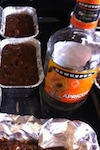 Fruitcake lovers tend to be quiet whereas fruitcake haters tend to be loud, but most fruitcake haters I know have never had good fruitcake (and some have never had any fruitcake at all). So it seems that makers of fruitcake either must either hide their wares under a bushel (no!) or share them with evangelical fervor. Thus, I have decided to become an evangelist for fruitcake. Because everyone (especially my brother-in-law who requires more prayer, for he has yet to refrain from making disparaging remarks while the rest of us groan and ask for more) needs to know how wonderful it is.
Fruitcake lovers tend to be quiet whereas fruitcake haters tend to be loud, but most fruitcake haters I know have never had good fruitcake (and some have never had any fruitcake at all). So it seems that makers of fruitcake either must either hide their wares under a bushel (no!) or share them with evangelical fervor. Thus, I have decided to become an evangelist for fruitcake. Because everyone (especially my brother-in-law who requires more prayer, for he has yet to refrain from making disparaging remarks while the rest of us groan and ask for more) needs to know how wonderful it is.
Taking the Long View in a Life of Hospitality
When visitors come into the well-supplied kitchen of our home, The Art House, with its 60” Wolf range and side-by-side refrigerators, they often rightly ask, “Do you like to cook?” I almost always stumble over a simple yes or no answer. After living most of my adult life feeding hungry people, I am very interested in food and cooking. But the interest has come alongside the necessity. Cooking has been unavoidable, a skill developed with use. Thankfully, I was inspired early on to see the kitchen as a wholly creative and meaningful place to work, so I have leaned into all the need with an imagination formed by those ideas.
With Bread
Company. Campaign. Champagne. Champion. Companion. Familiar words that sound so alike because they all spring from the same medieval French and Latin roots. “Com” = “with” and “Pan” = “bread.” “Camp” (champ) = “open country or field.” These words are cousins in etymology and function. To be a companion is literally to share bread with someone. To share bread with someone is to keep their good company. To keep their good company is to be their champion. And to be their champion is to be their defender, to walk among them and eat with them.
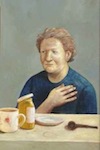 In my letters I tell him, “I wish you were here so I could make dinner for you.” I daydream about how when he is released, eight years from now, I’ll have mastered new cooking skills and will prepare him whatever he wants, however much he wants. I imagine I’ll hold a spoon coated in sauce or frosting up to his mouth and say, “Here. Taste this.” And he’ll close his eyes and taste it and then smile, like we were in a movie or something.
In my letters I tell him, “I wish you were here so I could make dinner for you.” I daydream about how when he is released, eight years from now, I’ll have mastered new cooking skills and will prepare him whatever he wants, however much he wants. I imagine I’ll hold a spoon coated in sauce or frosting up to his mouth and say, “Here. Taste this.” And he’ll close his eyes and taste it and then smile, like we were in a movie or something.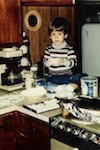 We lined the jars on the familiar countertop, but first things first: blanching and cutting the tomatoes. It takes some waiting, I discovered, but only after scalding my fingers — too impatient to let the water cool down. When I asked Grandma how she knew how much salt and sugar to add to the jars, she looked at me and said, “I do it that way because that’s what my mama always did.” There is no written recipe, only paying attention.
We lined the jars on the familiar countertop, but first things first: blanching and cutting the tomatoes. It takes some waiting, I discovered, but only after scalding my fingers — too impatient to let the water cool down. When I asked Grandma how she knew how much salt and sugar to add to the jars, she looked at me and said, “I do it that way because that’s what my mama always did.” There is no written recipe, only paying attention.Counterclockwise: Keeping an Open Door in a Timekept City
The mechanical clock, first introduced in Benedictine monasteries to regulate the hours of prayer, was perhaps the true starting point of the industrial age. Timekeeping exchanged the imprecise rhythms of an agrarian world, sunrise and sunset, feeding and milking, planting and harvest, for autonomous, mathematical regularity. It was a boon for business, enabling one to promise and deliver products at an exact time.
But the invention of the clock also had unintended consequences. Time became a currency: trafficked, not received. We make time, save time, spend time, waste time.
 What I didn’t realize was how deeply entwined are the concepts of hospitality and housework. Keeping a home is an extension of hospitality, not in the way we might think of it as occasionally entertaining guests, but as a way of life. It’s not so important to have a magazine-perfect home or spend hours on end cleaning, but taking the time to clean house, clothes, and people; to make a meal; to make comfortable spaces — these are vital tasks.
What I didn’t realize was how deeply entwined are the concepts of hospitality and housework. Keeping a home is an extension of hospitality, not in the way we might think of it as occasionally entertaining guests, but as a way of life. It’s not so important to have a magazine-perfect home or spend hours on end cleaning, but taking the time to clean house, clothes, and people; to make a meal; to make comfortable spaces — these are vital tasks.Righteousness and Bliss
Abstract humanity has no draining friendships, annoying relatives, or untidy neighbors. We are never responsible for, or adversely affected by, humanity in the abstract. Facebook statuses, sound bites, and shots across the bow ought not be confused with the real and costly love that underwrites transformation. Bliss without righteousness is vacant, but righteousness without bliss is cruel.
 Paris never slept, as I found to my pleasure when I returned at 21 and took up residence in a crummy hostel. Upland, in contrast, rarely seems to wake. But you can see the stars here like you never can in Paris, and the lonesome quiet of the prairie has started to feel like a companion. Maybe even a friend.
Paris never slept, as I found to my pleasure when I returned at 21 and took up residence in a crummy hostel. Upland, in contrast, rarely seems to wake. But you can see the stars here like you never can in Paris, and the lonesome quiet of the prairie has started to feel like a companion. Maybe even a friend.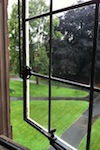 On the day I was making stock, I was also taking stock. No doubt many of us do that this time of year, with the old year gone out the back door and the lock turned behind it, the new year just over the threshold, still slipping off its coat.
On the day I was making stock, I was also taking stock. No doubt many of us do that this time of year, with the old year gone out the back door and the lock turned behind it, the new year just over the threshold, still slipping off its coat.
One way to consider and savor a year: Whom did I meet? What new friends did I collect and get collected by? What correspondents became a face and a voice and a delightfully embodied presence?
 For me, my recent visit to Laity Lodge was about opening my eyes to see that we are little children and everything we have is a gift. It was about opening my eyes to see that our heavenly Father is there. To see Him all around us — to see Him in places we may not have seen Him before — to see His love in everything that we have been given, in all the works of His hands.
For me, my recent visit to Laity Lodge was about opening my eyes to see that we are little children and everything we have is a gift. It was about opening my eyes to see that our heavenly Father is there. To see Him all around us — to see Him in places we may not have seen Him before — to see His love in everything that we have been given, in all the works of His hands. That moment threw a quiet mantle of wonder over the rest of the season, tinging every act with a significance I had never known. A few days before Christmas I was up on a ladder wiring greenery onto a chandelier in anticipation of the loved ones that were soon coming, humming “Lo, How a Rose” under my breath (anything that had anything to do with roses seemed inherent with meaning that year), when suddenly I stepped down, clippers in hand, under the thrall of a singularly beautiful thought. I went straight to the phone, dialed the wholesale florist I use, and promptly ordered a huge box of blood-red roses.
That moment threw a quiet mantle of wonder over the rest of the season, tinging every act with a significance I had never known. A few days before Christmas I was up on a ladder wiring greenery onto a chandelier in anticipation of the loved ones that were soon coming, humming “Lo, How a Rose” under my breath (anything that had anything to do with roses seemed inherent with meaning that year), when suddenly I stepped down, clippers in hand, under the thrall of a singularly beautiful thought. I went straight to the phone, dialed the wholesale florist I use, and promptly ordered a huge box of blood-red roses.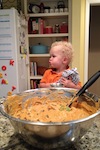 I thought I knew the importance of sharing food. I have taken food to new moms and seen my mom’s counter overflowing with casseroles after my dad died. I have experienced the common grace of bread and wine. But it wasn’t until my husband put a plate in front of my exhausted body every night that I truly understood how much he loved me. He nourished me until I was ready to survive. The closest I can come to describing it is that it felt like being protected in a womb just like I had protected my son for all those months.
I thought I knew the importance of sharing food. I have taken food to new moms and seen my mom’s counter overflowing with casseroles after my dad died. I have experienced the common grace of bread and wine. But it wasn’t until my husband put a plate in front of my exhausted body every night that I truly understood how much he loved me. He nourished me until I was ready to survive. The closest I can come to describing it is that it felt like being protected in a womb just like I had protected my son for all those months. It was not long after we landed that I became keenly aware of my own needs, which seemed myriad and great, physical and emotional and practical. As my pregnancy progressed, my body ached and grew weary very quickly, yet my responsibilities for my son and our household in this new place required a lot of physical activity. I was coming from a place where my sanity, and that of our son, was maintained by interacting with other families with small children on a daily basis, but in Iceland I knew no one.
It was not long after we landed that I became keenly aware of my own needs, which seemed myriad and great, physical and emotional and practical. As my pregnancy progressed, my body ached and grew weary very quickly, yet my responsibilities for my son and our household in this new place required a lot of physical activity. I was coming from a place where my sanity, and that of our son, was maintained by interacting with other families with small children on a daily basis, but in Iceland I knew no one.The Work of Love
As my journals filled with the details of my life — raising children to adulthood, becoming a writer, years of hosting people and events, the development of Art House America, pursuing a seminary degree, and becoming a grandmother — the words on the page gave me eyes to see the significance of the smaller things that are always present.
Sure, there are high points, nameable moments of climax — but most of my daily life still takes place in the in-between.
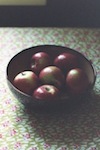 I took a photo after all, of the one thing of hers that I have asked for: her pencil cup, made of rolled magazine pages, pencils included. It came out blurry. Once I pulled the car up the drive and loaded my bags, she was ready for the customary parting hug on the front stoop. But I had one more task, to be completed indoors, so we returned to the kitchen.
I took a photo after all, of the one thing of hers that I have asked for: her pencil cup, made of rolled magazine pages, pencils included. It came out blurry. Once I pulled the car up the drive and loaded my bags, she was ready for the customary parting hug on the front stoop. But I had one more task, to be completed indoors, so we returned to the kitchen.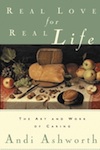 Van Gogh said something like this: “The highest form of art is fashioning human lives.” I’m not sure if that’s the exact quote, but it’s certainly true. You’re creating all the time — creating a mood, creating a meal, making a sick person comfortable, creating a celebration, nurturing compassion, creating a welcome — you’re always making. When our imaginations are captured by the idea of creating good stories in the lives of the people we’ve been given to love, a world of possibility opens up.
Van Gogh said something like this: “The highest form of art is fashioning human lives.” I’m not sure if that’s the exact quote, but it’s certainly true. You’re creating all the time — creating a mood, creating a meal, making a sick person comfortable, creating a celebration, nurturing compassion, creating a welcome — you’re always making. When our imaginations are captured by the idea of creating good stories in the lives of the people we’ve been given to love, a world of possibility opens up.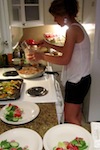 Even still, when I taste that particular gazpacho, I am rushed back to that day and that table. The cool, cucumbery freshness, the grassy bite of bell pepper, the distinct edge given by Tabasco and Worcestershire all combine to become a distinct place-marker in my mind. In fact, I recently made this picnic lunch for my sister and myself. As we each took our first bites of this cool and refreshing soup, I asked her what the taste made her think of, giving no hints or winks. The leaves on the trees rustled and shadows played on our quilt as she gave it some thought. “Painting the house that summer,” she said.
Even still, when I taste that particular gazpacho, I am rushed back to that day and that table. The cool, cucumbery freshness, the grassy bite of bell pepper, the distinct edge given by Tabasco and Worcestershire all combine to become a distinct place-marker in my mind. In fact, I recently made this picnic lunch for my sister and myself. As we each took our first bites of this cool and refreshing soup, I asked her what the taste made her think of, giving no hints or winks. The leaves on the trees rustled and shadows played on our quilt as she gave it some thought. “Painting the house that summer,” she said.


















